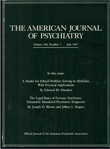Glucocorticoid resistance in depression: the dexamethasone suppression test and lymphocyte sensitivity to dexamethasone
Abstract
Approximately 50% of depressed patients are resistant to the cortisol- suppressing effect of dexamethasone. To determine if glucocorticoid resistance could be a more generalized phenomenon in depressed patients, mitogen stimulation tests were performed on lymphocytes from 12 depressed patients and 12 control subjects before and after dexamethasone administration. Suppression of serum cortisol following administration of 1 mg of dexamethasone in four depressed patients and 11 control subjects was associated with a decreased lymphoproliferative response, but no such change occurred in the eight depressed patients and the single control subject who did not suppress cortisol. The dexamethasone-induced changes in the mitogen responses were positively correlated with the highest postdexamethasone serum cortisol values.
Access content
To read the fulltext, please use one of the options below to sign in or purchase access.- Personal login
- Institutional Login
- Sign in via OpenAthens
- Register for access
-
Please login/register if you wish to pair your device and check access availability.
Not a subscriber?
PsychiatryOnline subscription options offer access to the DSM-5 library, books, journals, CME, and patient resources. This all-in-one virtual library provides psychiatrists and mental health professionals with key resources for diagnosis, treatment, research, and professional development.
Need more help? PsychiatryOnline Customer Service may be reached by emailing [email protected] or by calling 800-368-5777 (in the U.S.) or 703-907-7322 (outside the U.S.).



